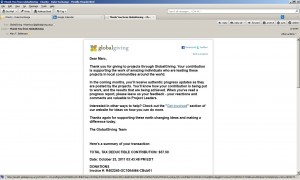Last Tuesday, my Cornell colleague, coauthor, and former advisor Chris Barrett was on The Daily Show with Jon Stewart discussing food aid. The video segment in which he appeared managed to make a very serious point — the effectiveness of the Food for Peace program is greatly undermined by the shipping lobby — while remaining highly satirical, and you can watch it here:
[comedycentral 429252]
According to an interview Chris gave to the Cornell Daily Sun, the taping of his part of the segment took about four hours.
For those of you who are not familiar with his work, Chris has worked on just about every aspect of food security, and I’d be hard pressed to pinpoint what he is most famous for. The above video, however, is about his work on food aid, the culmination of which has been his 2005 book with Dan Maxwell, Food Aid After Fifty Years.
For a more popular treatment of the weaknesses of US food aid because of the political economy landscape, I suggest reading Kilman and Thurow’s Enough: Why the World’s Poorest Starve in an Age of Plenty.
